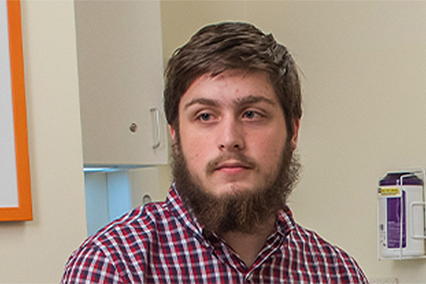Surveillance for Predisposition to Tumors (SPoT) Clinic
Children’s Mercy offers the Surveillance for Predisposition to Tumors (SPoT) Clinic to assist with early detection and treatment of tumors in children with hereditary cancer syndromes. The clinic was developed to monitor children with a variety of hereditary cancer syndromes that predispose them to different types of tumors in all parts of the body.
Peace of mind through frequent screenings
At each clinic visit, the team reviews national screening guidelines specific to the child’s diagnosis and makes sure the child is current on all surveillance testing. By monitoring these high-risk children more closely, the SPoT Clinic team helps improve the chances that a tumor or other concerning symptoms will be caught and addressed as early as possible.
We focus on kids who have complex cancer risks, meaning their risk for tumor development requires more complex screening schedules.
Cancer genomics specialists for children
The SPoT Clinic team includes Caitlin Schwager, pediatric oncology genetic counselor; Kevin Ginn, Director of the Pediatric Brain Tumor Program and Interim Director of the Experimental Therapeutics in Pediatric Oncology Program; and Erin Guest, Director of the Cancer Genomics Program and the Cancer Center Biorepository.
Providers from Psychology and Social Work also support the team to help address the unique needs of families with a predisposition to cancer. The clinic is held eight times a year, following approximately 30 to 40 children per year.
The SPoT Clinic acts as a safety net for high-risk children and their families. By increasing the frequency of check-ins, the clinic helps improve the quality of life for families that are impacted by hereditary cancer syndromes.
What are hereditary cancer syndromes?
A hereditary cancer syndrome is a genetic disorder that causes a higher-than-normal risk for specific types of cancer. Mutations in certain cancer-causing genes can increase the risk of cancer in children. Genetic counseling is especially beneficial for children with a strong family history of cancer or a cancer type that is associated with a known cancer syndrome.
A genetic counselor uses a detailed, multi-generational family history along with a risk assessment to help families understand the benefits, limitations and implications of genetic testing. If testing does indicate a hereditary cancer syndrome, additional relatives, such as parents, siblings and extended family members, can also be tested for the condition.
The SPoT Clinic is one way that Children’s Mercy helps children and families impacted by hereditary cancer syndromes to monitor for the specific concerns that affect them.
Von Hippel-Lindau syndrome (VHL): Bryce's story
Bryce and his younger brothers, Clayton and Michael, all have a genetic condition called von Hippel-Lindau syndrome, which causes tumors to form on the adrenal glands. The Children's Mercy Cancer Center team monitors Bryce and his brothers through the Surveillance for Predisposition to Tumors (SPoT) Clinic. This clinic provides regular check-ups for children with genetic conditions that are more likely to cause tumors.

- Cancer Center
- Cancer in Adolescents and Young Adults
- Brain Tumor Treatment
- Experimental Therapeutics
- Genomic Medicine in Cancer Treatment
- Histiocytosis Program
- Leukemia and Lymphoma Program
- Li Fraumeni Syndrome
- Liver Cancer Treatment
- Proton Therapy
- Soft Tissue and Bone Sarcomas
- Spanish-Speaking Cancer Clinic
- Surveillance for Predisposition to Tumors (SPoT) Clinic
- Survive & Thrive
- Cancer Center Family Care Team
- Hematology, Oncology, and Blood and Marrow Transplant
- Meet the Team
